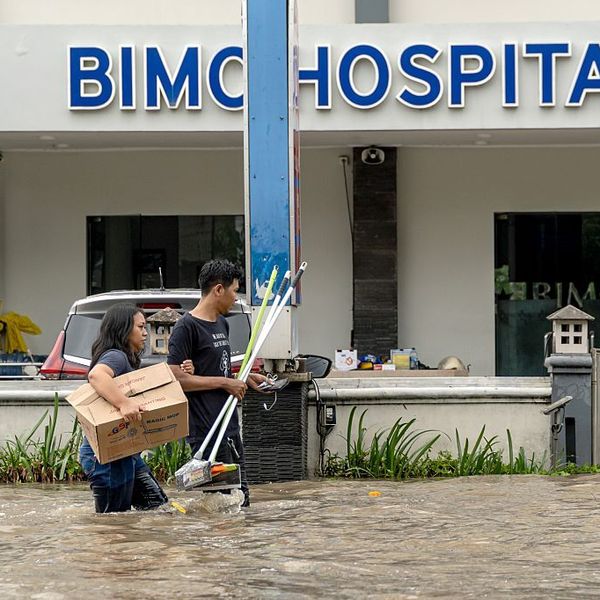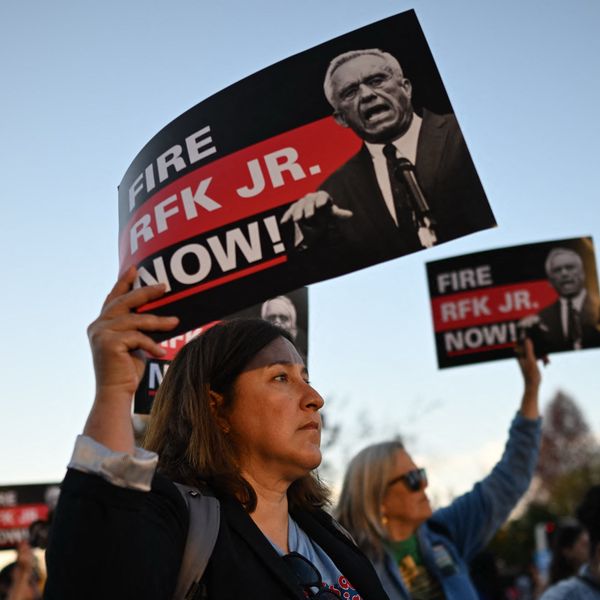WHO Warns of 'Explosively Spreading' Zika Virus
Agency will meet to determine if the outbreak, which has gone from 'a mild threat to one of alarming proportions,' should be treated as 'global emergency'
The World Health Organization (WHO) has set up an emergency response team to address the outbreak of the Zika virus, the mosquito-borne infection that has been linked to severe birth defects and is spreading across the Americas with "explosive" speed.
Zika cases have now been confirmed in 23 countries and territories. WHO predicts that up to four million people will be infected this year, although most will not develop symptoms. The group's director-general, Margaret Chan, on Monday will convene an International Health Regulations Emergency Committee in Geneva to determine whether the spread should be treated as a global emergency.
The epidemic has gone from "a mild threat to one of alarming proportions," Chan said in a speech Thursday morning. "The level of concern is high, as is the level of uncertainty. We need to get some answers quickly."
The announcement comes just a week after the WHO warned that Zika is likely to spread to all countries across the Americas except for Canada and Chile. The U.S. director of National Institutes of Health (NIH) said that could eventually include regions where 60 percent of the U.S. population lives.
Since October, Brazil has seen 4,180 cases of microcephaly--a condition in which the head develops abnormally small--up from just 146 cases in 2014. Chan also said that there has been a corresponding rise in cases of Guillain-Barre syndrome, a rare and "poorly understood" autoimmune disease that can cause severe paralysis.
While there is no conclusive evidence that Zika is the cause of the conditions, Chan said the link was "strongly suspected" and "deeply alarming," calling the epidemic "heartbreaking." Authorities in Brazil, Colombia, Jamaica, El Salvador, and Venezuela publicly urged women to avoid getting pregnant altogether.
"We cannot tolerate the prospect of more babies being born with neurological and other malformations and more people facing the threat of paralysis," said Dr. Carissa Etienne, the regional-director for the WHO Pan American Health Organization (PANO).
On Wednesday, an article published in the Journal of the American Medical Association criticized the WHO for what some saw as a delayed response to the crisis. Researchers Daniel Lucey and Lawrence Gostin wrote, "The very process of convening the committee would catalyze international attention, funding, and research. While Brazil, PAHO, and the CDC [Center for Disease Control and Prevention] have acted rapidly, WHO headquarters has thus far not been proactive, given potentially serious ramifications."
Following the WHO's announcement on Thursday, Gostin called on Chan to "urgently mobilize international resources to curb the rapid spread of Zika worldwide, including aggressive mosquito control, active surveillance, accelerated vaccine research and travel advisories for pregnant women."
"It is far better to be overprepared than to wait until a Zika epidemic spins out of control," Gostin said.
An Urgent Message From Our Co-Founder
Dear Common Dreams reader, The U.S. is on a fast track to authoritarianism like nothing I've ever seen. Meanwhile, corporate news outlets are utterly capitulating to Trump, twisting their coverage to avoid drawing his ire while lining up to stuff cash in his pockets. That's why I believe that Common Dreams is doing the best and most consequential reporting that we've ever done. Our small but mighty team is a progressive reporting powerhouse, covering the news every day that the corporate media never will. Our mission has always been simple: To inform. To inspire. And to ignite change for the common good. Now here's the key piece that I want all our readers to understand: None of this would be possible without your financial support. That's not just some fundraising cliche. It's the absolute and literal truth. We don't accept corporate advertising and never will. We don't have a paywall because we don't think people should be blocked from critical news based on their ability to pay. Everything we do is funded by the donations of readers like you. Will you donate now to help power the nonprofit, independent reporting of Common Dreams? Thank you for being a vital member of our community. Together, we can keep independent journalism alive when it’s needed most. - Craig Brown, Co-founder |
The World Health Organization (WHO) has set up an emergency response team to address the outbreak of the Zika virus, the mosquito-borne infection that has been linked to severe birth defects and is spreading across the Americas with "explosive" speed.
Zika cases have now been confirmed in 23 countries and territories. WHO predicts that up to four million people will be infected this year, although most will not develop symptoms. The group's director-general, Margaret Chan, on Monday will convene an International Health Regulations Emergency Committee in Geneva to determine whether the spread should be treated as a global emergency.
The epidemic has gone from "a mild threat to one of alarming proportions," Chan said in a speech Thursday morning. "The level of concern is high, as is the level of uncertainty. We need to get some answers quickly."
The announcement comes just a week after the WHO warned that Zika is likely to spread to all countries across the Americas except for Canada and Chile. The U.S. director of National Institutes of Health (NIH) said that could eventually include regions where 60 percent of the U.S. population lives.
Since October, Brazil has seen 4,180 cases of microcephaly--a condition in which the head develops abnormally small--up from just 146 cases in 2014. Chan also said that there has been a corresponding rise in cases of Guillain-Barre syndrome, a rare and "poorly understood" autoimmune disease that can cause severe paralysis.
While there is no conclusive evidence that Zika is the cause of the conditions, Chan said the link was "strongly suspected" and "deeply alarming," calling the epidemic "heartbreaking." Authorities in Brazil, Colombia, Jamaica, El Salvador, and Venezuela publicly urged women to avoid getting pregnant altogether.
"We cannot tolerate the prospect of more babies being born with neurological and other malformations and more people facing the threat of paralysis," said Dr. Carissa Etienne, the regional-director for the WHO Pan American Health Organization (PANO).
On Wednesday, an article published in the Journal of the American Medical Association criticized the WHO for what some saw as a delayed response to the crisis. Researchers Daniel Lucey and Lawrence Gostin wrote, "The very process of convening the committee would catalyze international attention, funding, and research. While Brazil, PAHO, and the CDC [Center for Disease Control and Prevention] have acted rapidly, WHO headquarters has thus far not been proactive, given potentially serious ramifications."
Following the WHO's announcement on Thursday, Gostin called on Chan to "urgently mobilize international resources to curb the rapid spread of Zika worldwide, including aggressive mosquito control, active surveillance, accelerated vaccine research and travel advisories for pregnant women."
"It is far better to be overprepared than to wait until a Zika epidemic spins out of control," Gostin said.
The World Health Organization (WHO) has set up an emergency response team to address the outbreak of the Zika virus, the mosquito-borne infection that has been linked to severe birth defects and is spreading across the Americas with "explosive" speed.
Zika cases have now been confirmed in 23 countries and territories. WHO predicts that up to four million people will be infected this year, although most will not develop symptoms. The group's director-general, Margaret Chan, on Monday will convene an International Health Regulations Emergency Committee in Geneva to determine whether the spread should be treated as a global emergency.
The epidemic has gone from "a mild threat to one of alarming proportions," Chan said in a speech Thursday morning. "The level of concern is high, as is the level of uncertainty. We need to get some answers quickly."
The announcement comes just a week after the WHO warned that Zika is likely to spread to all countries across the Americas except for Canada and Chile. The U.S. director of National Institutes of Health (NIH) said that could eventually include regions where 60 percent of the U.S. population lives.
Since October, Brazil has seen 4,180 cases of microcephaly--a condition in which the head develops abnormally small--up from just 146 cases in 2014. Chan also said that there has been a corresponding rise in cases of Guillain-Barre syndrome, a rare and "poorly understood" autoimmune disease that can cause severe paralysis.
While there is no conclusive evidence that Zika is the cause of the conditions, Chan said the link was "strongly suspected" and "deeply alarming," calling the epidemic "heartbreaking." Authorities in Brazil, Colombia, Jamaica, El Salvador, and Venezuela publicly urged women to avoid getting pregnant altogether.
"We cannot tolerate the prospect of more babies being born with neurological and other malformations and more people facing the threat of paralysis," said Dr. Carissa Etienne, the regional-director for the WHO Pan American Health Organization (PANO).
On Wednesday, an article published in the Journal of the American Medical Association criticized the WHO for what some saw as a delayed response to the crisis. Researchers Daniel Lucey and Lawrence Gostin wrote, "The very process of convening the committee would catalyze international attention, funding, and research. While Brazil, PAHO, and the CDC [Center for Disease Control and Prevention] have acted rapidly, WHO headquarters has thus far not been proactive, given potentially serious ramifications."
Following the WHO's announcement on Thursday, Gostin called on Chan to "urgently mobilize international resources to curb the rapid spread of Zika worldwide, including aggressive mosquito control, active surveillance, accelerated vaccine research and travel advisories for pregnant women."
"It is far better to be overprepared than to wait until a Zika epidemic spins out of control," Gostin said.

